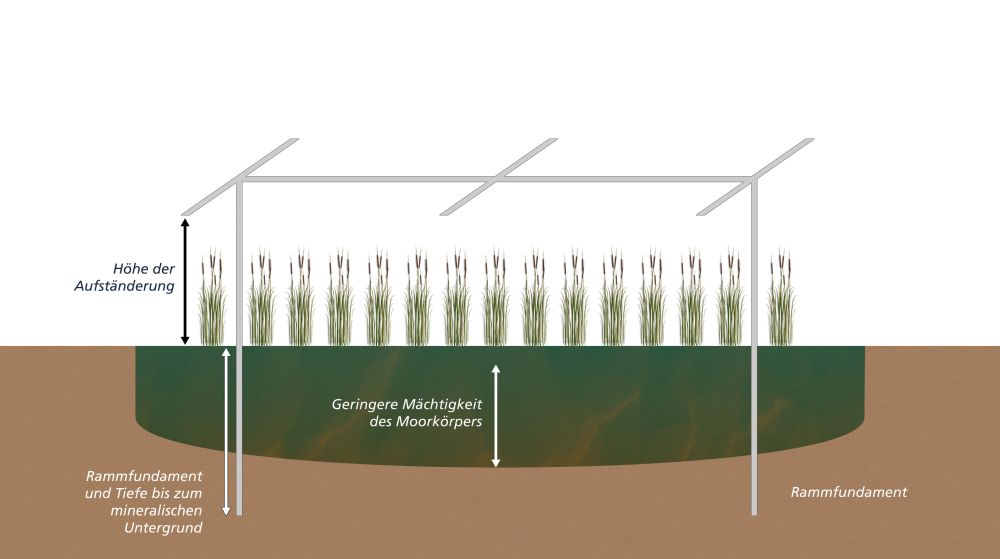| Duration: | 12/2024 - 06/2028 |
| Contracting Authority/ Sponsors: | Federal Ministry of Education and Research (BMBF) |
| Project Partners: | University Greifswald (Project Management); University Hohenheim (Stuttgart); Johann Heinrich von Thünen-Institut Bundesforschungsinstitut für Ländliche Räume, Wald und Fischerei (Braunschweig) |
| Project Focus: | |
| Website: | MoorPower |
MoorPower – Sustainable and Innovative Photovoltaic Solutions for Rewetted Peatlands
Peatlands and other organic soils cover almost 7% of the agricultural land in Germany and their drainage-based use causes around 44% of total greenhouse gas (GHG) emissions from agriculture and agricultural land use due to the mineralization of peat soils, approx. 43 million t. CO2-eq. in 2021 (UBA 2023). Rewetting is the most effective measure to reduce emissions. In order to achieve the climate targets that Germany has set itself, at least 50,000 ha of currently drained peatlands must be rewetted each year (Tanneberger et al. 2021). The combination of PV systems and rewetting could be a significant lever for achieving this goal (Grethe et al. 2021).
The goals of the “MoorPower” research project are to comprehensively investigate the technical, ecological and socio-economic effects and legal issues of the combination of peatland rewetting and photovoltaics (peatland PV), including in combination with paludiculture (Paludi PV), and to derive recommendations for the concrete implementation of peatland/Paludi PV in Germany. The implementation of photovoltaic systems on rewetted peatlands with simultaneous use of biomass in paludiculture can make a threefold contribution to climate protection through direct energy generation from PV, avoidance of greenhouse gas emissions through rewetting of peatlands and provision of renewable resources in paludiculture, while at the same time promoting biodiversity.
In order to achieve the comprehensive and cross-scale processing of the objectives outlined above, MoorPower will work on at least three test areas (material test area, implementation area, experimental area). Investigations on the material test area include, for example, the effects of the peatland on the materials and installations used, but also the influence of the materials used on water quality, soil physics and the microbiome. However, some ecological and economic issues can only be meaningfully determined on the scale of really large implementation areas, such as the overall greenhouse gas balance or economic aspects. The experimental facility set up as part of this project is planned as an open research platform on which any further research on the topic beyond this project is welcome.
The research project creates knowledge on central objectives of the Natural Climate Protection Action Program (ANK), namely the restoration of functional ecosystems, which simultaneously contribute to climate protection and provide valuable habitats for plants and animals. The project will make an important contribution to overcoming current challenges, namely climate protection, energy security, biodiversity conservation and sustainable agriculture.

